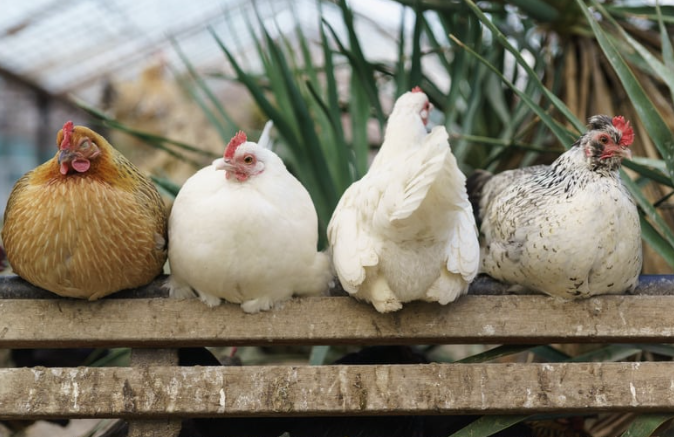
As of March 4, 2025, Georgia is once again considered to an HPAI free state. Practicing biosecurity measures can help ensure that your backyard flock is kept safe from not only HPAI, but other diseases as well. Keep in mind that no biosecurity program is 100% effective because mistakes can be made, but having a program in place, no matter how small your flock, can help to minimize your risk. The following is not an all-encompassing list, but an overview of a few options. Please reach out if you need help planning a biosecurity program.
Sanitation methods are huge in biosecurity and may be simple changes to make that you haven’t thought of before. For instance, you should have dedicated footwear and clothes when you are tending to your birds. This means changing out of your “everyday” shoes/clothes into sets that you only wear to the coop/around the flock. The bottoms of our shoes pick up germs and debris every day. If you go to the same store behind someone with an infected flock, and they have debris from their flock on their shoes, you risk picking it up and taking it back to your own birds. A designated pair of shoes to change into can help you to avoid this issue in a simple way. A sanitizing footbath that you use before being near your birds can help with this issue, but it is not a complete substitute for the dedicated footwear.
Waterfowl are the main carriers of HPAI and can transmit it quickly. Do not let your birds drink untreated water from lakes/ponds, as these wild birds and waterfowl would have direct access to the water. Along with this, you should never let waterfowl become residents near your flock, no matter how big or small. This is opening a door to a world of biosecurity issues. Along the same lines, you should not come into direct contact with wild birds. Even within the flock, isolation can be beneficial. When you get new stock that you want to introduce, they should be quarantined for 3-4 weeks before being mixed with the existing flock. If you have sick birds within the flock, they should also be quarantined until their symptoms are resolved as well.
Any year, but especially now with the outbreak, you should be monitoring your flocks for symptoms of HPAI/Avian Influenza. These symptoms include sudden mortality, discolored combs and feet, drop in egg production, and birds that will stop eating and drinking, along with the nasal discharge. If you find birds that you believe are symptomatic in your own flock, or find dead wild birds, they need to be reported immediately. If it is your own flock, you should reach out to the Georgia Department of Agriculture. If it is a wild bird, it needs to be reported to the Georgia Department of Natural Resources.
When it comes down to basic biosecurity, there are some considerations to keep in mind. Each house/coop needs to have its own independent line of separation between the live bird environment and the outside world. You should also avoid mixing species and age groups. Minimizing flock exposure by visitors who have their own birds is crucial but so is being careful about visiting other flocks and then coming back to your own. If you have multiple coops, avoid coop congregations and flock visits – keep them in their own coops/areas and minimize the sharing of equipment, even between coops/houses. Make sure you clean and disinfect regularly.
Iowa State University has a great webpage centered around poultry biosecurity. If you go to https://poultrybiosecurity.org you will find resources on implementing a biosecurity plan, how to write a plan that is site specific, cleaning and disinfection information, ways to document your biosecurity, signage that can be used on-site, and much more!
If you have any questions, please feel free to contact me at mckenzie.wheeler@uga.edu or at 706-629-8685. Interested in starting your own backyard flock, or to brush up on your knowledge for the birds you already have? Join us to hear Dr. Casey Ritz, University of Georgia Poultry specialist, as he goes over the basics of a backyard flock and what you need to know to be successful on April 1st from 6:00 pm until 8:00 pm! Dinner will be provided by the Gordon County Young Farmers Association. Please reach out to me to RSVP so that we can get an accurate count for dinner.
